27 Mar 2017 | About Index, Campaigns -- Featured, Counter Terrorism, Digital Freedom, Digital Freedom Statements, Statements, United Kingdom
Encrypted communication tools are used by investigative journalists and reporters under fire, as well as businesses and governments, to have safe conversations and to report on difficult and often dangerous situations.
Attempts by the UK government to create a backdoor into these services would potentially put lives at risk by making the systems far less safe. It would certainly curtail reporting from dangerous regions.
27 Mar 2017 | Belarus, Campaigns, Campaigns -- Featured, Statements
[vc_row][vc_column][vc_column_text]
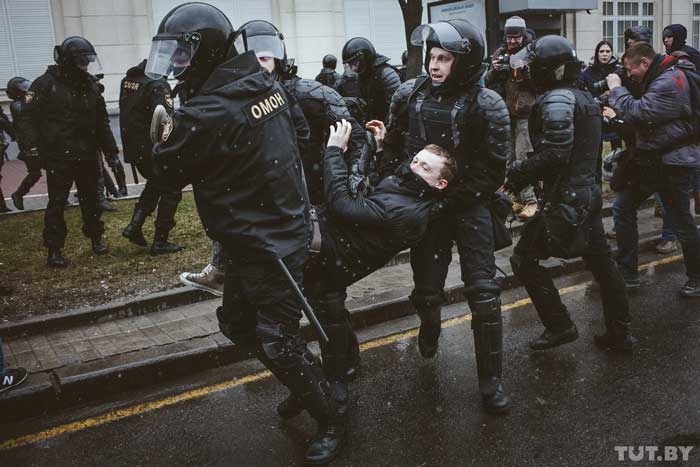
Belarusian police detain Belarus Free Theatre’s Siarhai Kvachonok on Saturday March 25 2017 during protests against Presidential Decree No 3, which imposes a tax on unemployed people. (Photo: Tut.by)
Index on Censorship condemns the continued crackdown on protesters in Europe’s last dictatorship.
Belarusian authorities detained about 400 people over the weekend as Freedom Day demonstrations against the country’s Presidential Decree No. 3, which imposes a tax on the unemployed. Protesters were met by riot police and many were reportedly assaulted.
“This is in clear violation of the right to freedom of expression and freedom of assembly. Index demands all detainees be immediately and unconditionally released and all charges be dropped,” Melody Patry, head of advocacy at Index on Censorship, said.
Among the detainees were international and domestic journalists, human rights defenders, and actors and playwrights working for the UK-based Belarus Free Theatre.
BFT staffer, Siarhai Kvachonok was sentenced to 10 days detention on Monday March 27 for his participation in the protest. Among his charges: “Using strong language, shouting and hooliganism”. Yana Rusakevich, another BFT member, was located in a hospital with a concussion on Sunday. On Saturday, BFT manager Svetlana Sugako was filmed being arrested by the BBC.
Artistic Director Natalia Kaliada of the BFT told The Guardian: “It’s a strategy of arrests and clearing the streets and blocking the internet that they think will spook people, but people are very angry. All these arrests and splitting up the crowds might make things a little quieter in Minsk, but now these protests are happening all over Belarus. This is the worst crackdown over the last seven years, but it would have been the biggest protest. People don’t care, they want an end to this dictator. They say ‘basta’ – enough.”[/vc_column_text][/vc_column][/vc_row][vc_row equal_height=”yes” el_class=”text_white” css=”.vc_custom_1490626863780{background-color: #dd3333 !important;background-position: center !important;background-repeat: no-repeat !important;background-size: cover !important;}”][vc_column width=”1/2″][vc_custom_heading text=”Belarus: Mass detentions of journalists at Freedom Day protests” font_container=”tag:p|font_size:28|text_align:left” use_theme_fonts=”yes” link=”url:https%3A%2F%2Fmappingmediafreedom.org%2F%23%2F3877|||”][vc_column_text]Mass detentions of journalists took place in three Belarusian cities during Freedom Day marches, according to the Belorussian Association of Journalists. Over 35 foreign and domestic journalists were detained. Read the full report on Mapping Media Freedom[/vc_column_text][/vc_column][vc_column width=”1/2″ css=”.vc_custom_1490627099721{background-image: url(https://www.indexoncensorship.org/wp-content/uploads/2017/02/MMF_report_2016_cover.jpg?id=85855) !important;background-position: center !important;background-repeat: no-repeat !important;background-size: cover !important;}”][/vc_column][/vc_row][vc_row][vc_column][vc_basic_grid post_type=”post” max_items=”4″ element_width=”6″ grid_id=”vc_gid:1490626915933-142b19eb-1c90-10″ taxonomies=”172, 7379, 301″][/vc_column][/vc_row]
27 Mar 2017 | Index in the Press
International freedom of speech campaigners have penned an appeal to Kazakhstan’s President Nursultan Nazarbayev to guarantee the safety of jailed journalist Zhanbolat Mamay and to ensure an impartial investigation into his case. Read the full article
23 Mar 2017 | Awards, News and features
[vc_row][vc_column][vc_column_text]
Hungary’s high tide of populism was beaten back briefly in October 2016 when prime minister Viktor Orban’s referendum on closing the door on refugees was ruled invalid after just 44% of the population bothered to show up and vote.
The country’s Two-tailed Dog Party don’t take credit for the result, but were certainly part of the mass soft power endeavour that defeated the referendum, and they used a tact rarely seen in Hungarian politics today: humour.
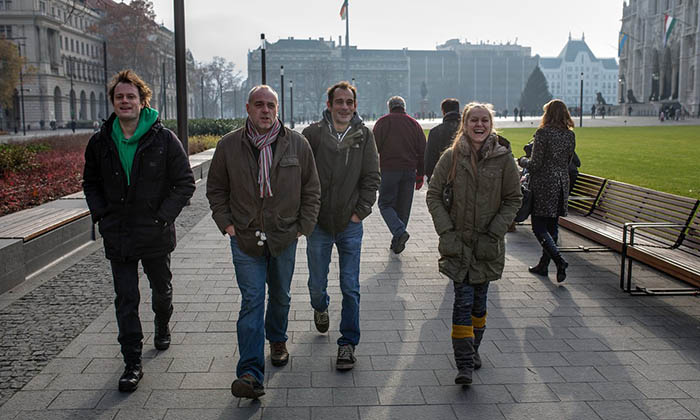

They urged voters to “Vote invalidly!” by answering both yes and no. “A stupid answer to a stupid question.”
What officially became known as the Two-tailed Dog Party in 2006 has been around since 2000, when it was a group of street artists fronted by Gergely Kovács. In their current form they parody political discourse in Hungary with artistic stunts and creative campaigns.
The Two-tailed Dog is a vital alternative voice following the rise of Orban and is now a registered political party ready to contest in 2018’s parliamentary elections. They can no longer be written off as a joke.
When the prime minister started plastering Hungary with anti-immigrant posters with slogans like “If you come to Hungary, you may not take jobs away from Hungarians,” and “If you come to Hungary, you must respect our culture,” the Two-tailed Dog responded with a billboard campaign of their own: “If you are Hungary’s prime minister, you have to obey our laws,”; “Come to Hungary by all means, we’re already working in London.”
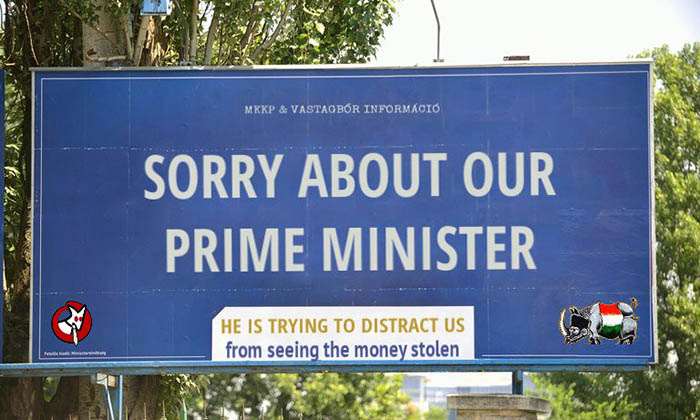
The lampooning was largely crowdfunded, and volunteers from around the country were on hand to erect 500 outdoor billboards and over 100,000 smaller posters.
When Orban introduced the national consultation on immigration and terrorism in 2015, as part of a series of xenophobic measures to repel tens of thousands of migrants and refugees, and plastered cities with anti-immigrant billboards, the Two-tailed Dog launched mock questionnaires and even more billboards and posters.
Relentlessly attempting to reinvigorate public debate and draw attention to under-covered taboo topics, the party’s recent efforts also include painting broken pavement to draw attention to a lack of public funding.

“It would be important for people to be able to discuss things again and for the atmosphere in the country to finally improve and change back to normal,” Kovács says.

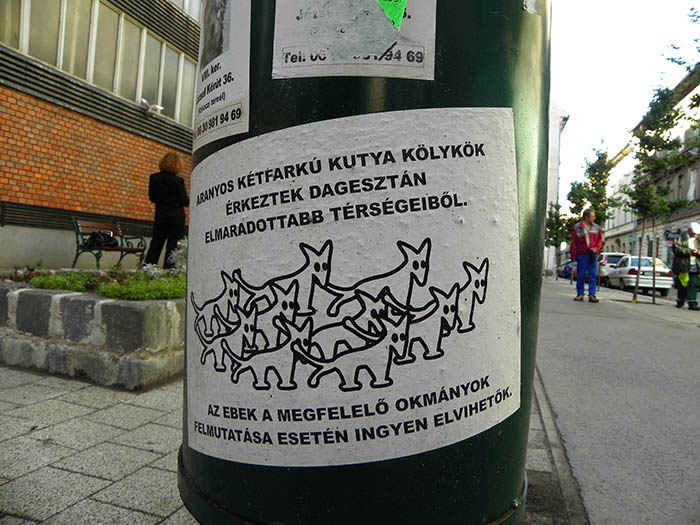
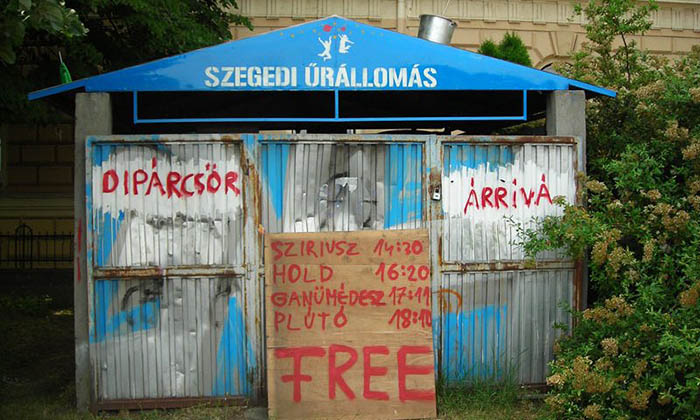
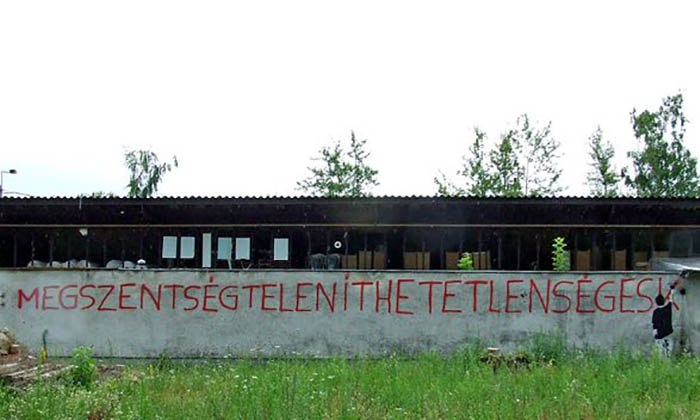 [/vc_column_text][/vc_column][/vc_row][vc_row full_width=”stretch_row_content” equal_height=”yes” el_class=”text_white” css=”.vc_custom_1490258749071{background-color: #cb3000 !important;}”][vc_column width=”1/2″][vc_custom_heading text=”Support the Index Fellowship.” font_container=”tag:p|font_size:28|text_align:center” use_theme_fonts=”yes” link=”url:https%3A%2F%2Fwww.indexoncensorship.org%2Fsupport-the-freedom-of-expression-awards%2F|||”][vc_column_text]
[/vc_column_text][/vc_column][/vc_row][vc_row full_width=”stretch_row_content” equal_height=”yes” el_class=”text_white” css=”.vc_custom_1490258749071{background-color: #cb3000 !important;}”][vc_column width=”1/2″][vc_custom_heading text=”Support the Index Fellowship.” font_container=”tag:p|font_size:28|text_align:center” use_theme_fonts=”yes” link=”url:https%3A%2F%2Fwww.indexoncensorship.org%2Fsupport-the-freedom-of-expression-awards%2F|||”][vc_column_text]
By donating to the Freedom of Expression Awards you help us support
individuals and groups at the forefront of tackling censorship.
Find out more
[/vc_column_text][/vc_column][vc_column width=”1/2″ css=”.vc_custom_1490258649778{background-image: url(https://www.indexoncensorship.org/wp-content/uploads/2016/04/donate-heads-slider.jpg?id=75349) !important;background-position: center !important;background-repeat: no-repeat !important;background-size: cover !important;}”][/vc_column][/vc_row][vc_row][vc_column][vc_basic_grid post_type=”post” max_items=”4″ element_width=”6″ grid_id=”vc_gid:1490271092003-8af6e4a2-7218-9″ taxonomies=”8734″][/vc_column][/vc_row]










